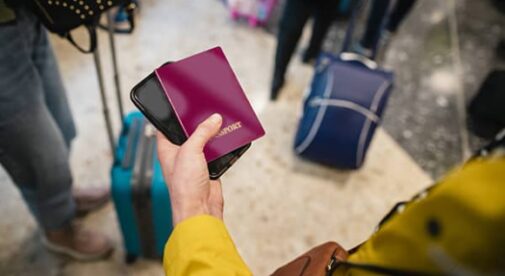I recently read two striking articles. One, in The Economic Times of India, reviewed the state of global mobility.
The author began by noting that renowned Indian author Salman Rushdie called his British passport “the most precious book I possess.” By contrast, the Indian passport he held as a young man was just “a paltry thing.” Rushdie said his career as a writer was only possible because the scarlet British document “did its stuff efficiently and unobtrusively” … effectively allowing him to become the man he is today.
Rushdie’s musings mirror my own, albeit indirectly.
About a decade ago, I worked for a U.S. non-profit assisting recovery from a devastating earthquake in Haiti. I spent about six months in the country and got to know it well.
The country is one of the most brutally poor and degraded places I’ve ever been—which is saying a lot; I’ve travelled to more than 90 countries.
Two facts in particular make life difficult for Haitians:
First, nationality is determined by birth. If fate’s lottery places you in a place like Haiti, your lot in life is determined.
Second, the reason for this is the international system of nation-states and the progressive tightening of international movement since the end of the First World War. A little more than a century ago, people could travel from one place to another without too much trouble, no matter where they were from, and whether they had official documents or not. Today, the world is a chess board whose squares are tightly sealed by each one’s laws.
Most of us lucky enough to have been born in a place like the U.S. (and who have the means to travel internationally) never really noticed these facts until the COVID pandemic. Without warning, freedom we took for granted disappeared. Like Haitians, we were trapped inside the borders of the country of our birth. Fortunately for us, it’s a big and prosperous country… for now.
For people born in places like the U.S., global mobility is on the rise. According to Arton Capital’s “World Openness Score,” the number of countries one can enter without a visa reached an all-time high at the end of 2022.
But there’s a massive gap between the travel freedoms afforded to people born in rich countries and those born everywhere else. As the author points out, “the United Nations may proclaim that ‘everyone has the right to leave any country, including one’s own, and to return to one’s country,’ but the fact is, not all passports are created equal or treated with equal respect.”
Arton’s top scoring passport is the United Arab Emirates, the fantastically wealthy oil sheikdom. Every “developed” country, including all Europe, North America, most of Latin America, and Australia, New Zealand, Malaysia, Singapore, South Korea, and Japan comfortably score above 150.
At the other end, a swathe of countries stretching from Central and North Africa to Southeast Asia rank below Arton’s median score of 99. In the Western Hemisphere, Haiti scores 61, one ahead of Liberia and one below Turkmenistan. The absolute worst passport in the world from a mobility perspective is Afghanistan’s, at 38. Overall, about 2/3 of the world’s passports limit their holder’s global mobility significantly.
Now for the second article I came across recently. It was a gushing treatment of recent developments in fast-track residency and citizenship in the Dominican Republic, which shares the island of Hispaniola with Haiti. It allows you to obtain permanent residency in two months and get a passport in about 18 months. That makes it one of the fastest non-citizenship by investment options in the world.
Sounds wonderful, right? Perhaps, if what you really want in life is to live in the DR. On the other hand, if you’re trying to protect your global mobility from potential future threats, you probably want to give the Dominican Republic a pass: it scores a measly 81 on Arton’s index, well below the global average.
The bottom line is that when it comes to global mobility, you are your country and its passport. If you’re trying to preserve and grow your options, you need to think about a lot more than just how quickly you can get a new one.
 Ted Baumann is International Living’s Chief Global Diversification Expert. He’s traveled to nearly 90 countries and is a dual citizen of the United States and South Africa. Ted has been published in international research journals, as well as in media outlets such as Barrons, Forbes, and Cheddar. Learn more about Ted Baumann here.
Ted Baumann is International Living’s Chief Global Diversification Expert. He’s traveled to nearly 90 countries and is a dual citizen of the United States and South Africa. Ted has been published in international research journals, as well as in media outlets such as Barrons, Forbes, and Cheddar. Learn more about Ted Baumann here.

How to Get a Second Passport: The World’s Most Valuable Document Right Now
Learn more about the best ways to boost your income and protect your wealth in our daily e-letter Field Notes with Jeff Opdyke.
• Valuable second passport—U.S. passport not affected
• The 21 passports you could be entitled to right now (including 11 European passports)
• A useful key to unlock closed and locked down travel borders
Claim your FREE report + video to learn more
Related Articles
U.S. Tax Is Bizarre, Here’s Why
Second Passports Aren’t Just For The Rich
Upcoming Conferences
The Only 2024 Fast Track Panama Conference
If your dream retirement involves stunning beaches… lush green mountains… a warm climate with no hurricanes… first-rate healthcare… incredible value for money (a couple can live well on $2,200 a month)… and the World’s #1 Retiree Discount Program…
Join our Panama experts and expats in February and discover why Panama could be your perfect paradise.


.png)